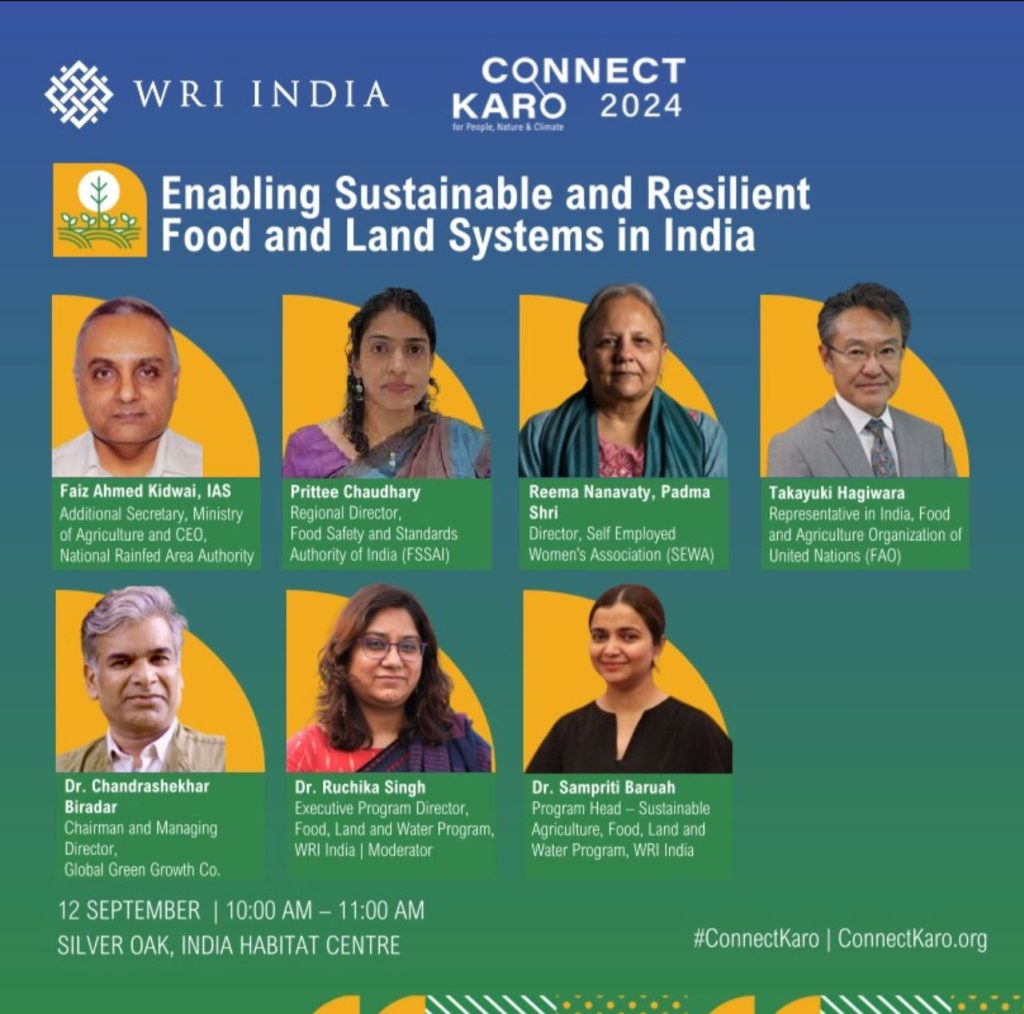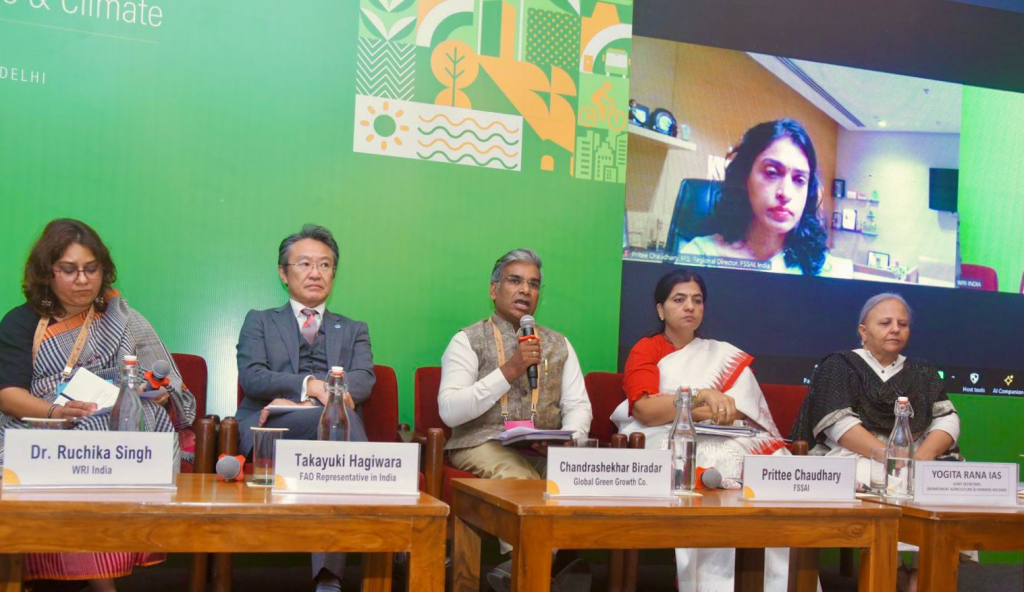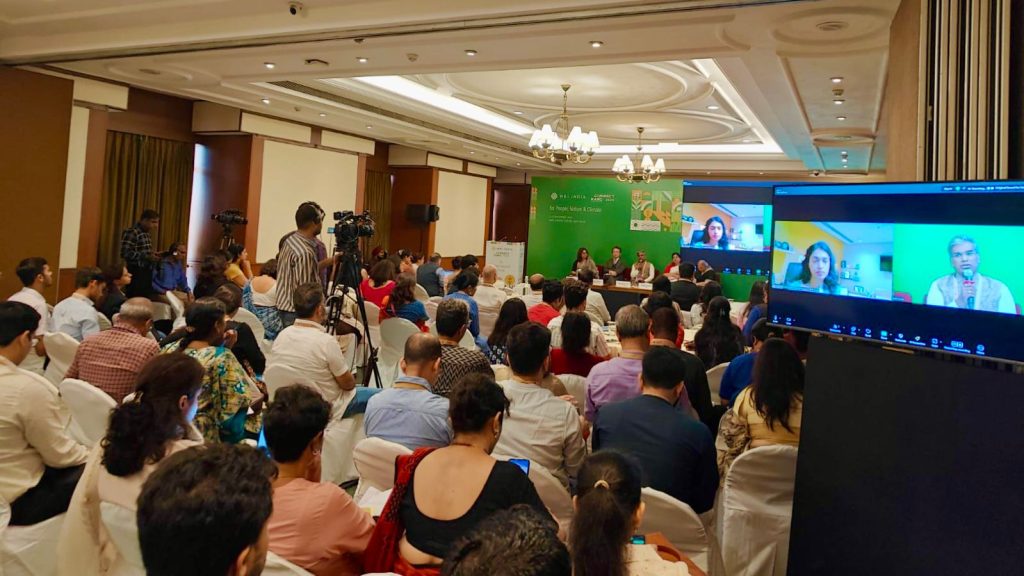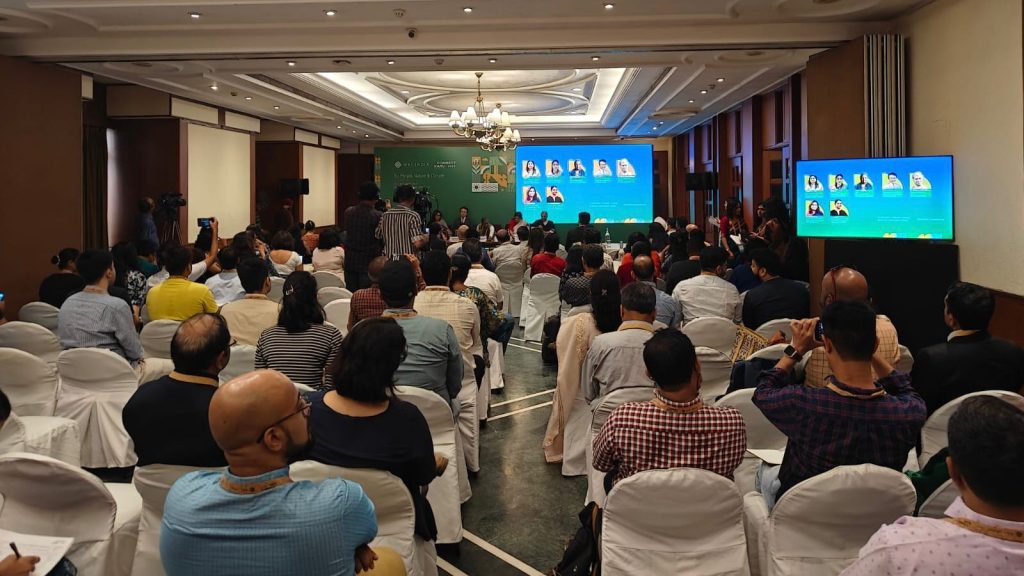Blog

12
SepTransforming India’s Food and Land Systems for a Healthier Future
Insights from the High-Level Plenary on Enabling Sustainable and Resilient Food and Land Systems in India. By CM Biradar

In a world grappling with climate change and public health crises, India stands at a critical crossroads. The recent high-level plenary discussion on “Enabling Sustainable and Resilient Food and Land Systems in India” brought together experts, policymakers, and industry leaders to address one of the most pressing challenges of our time: how to create a food system that nourishes both our people and our planet.

The Interconnected Crisis: Land Degradation and Public Health
The plenary highlighted a stark reality: the health of India’s population is inextricably linked to the health of its land. Consider these sobering statistics:
- Nearly half of India’s population faces chronic health issues
- Every second Indian adult leads an inactive lifestyle (WHO, 2024)
- 147 million hectares of land are affected by degradation
- Over 35% of districts are experiencing groundwater depletion (225 of 700 districts)

These figures paint a picture of a nation where the decline in land health is mirrored by a decline in human health. With half of India’s workforce tied to food and land systems, the economic implications of this crisis are profound.
A Holistic Solution: Functional Agroecosystems and Agroforestry
The good news? We have a powerful solution at our fingertips. The plenary emphasized the potential of functional agroecosystems and agroforestry to address both land and human health simultaneously. This approach focuses on creating systems characterized by “five highs”:
- High Biodiversity: Integrating diverse crops, multifunctional trees and indigenous livestock to enhance ecosystem resilience and nutritional diversity.
- High Carbon in Land: Sequestering carbon in soil and biomass, combating climate change while improving soil fertility.
- High Water in Soil: Enhancing water retention, reducing runoff, and return of springsheds are crucial in a country facing severe water scarcity.
- High Productivity: Diversifying income streams and increasing yield stability in the face of climate uncertainties.
- High Equity: Creating year-round employment opportunities, particularly benefiting small farmers and women.
The Multiple Benefits of Transformation
By embracing functional agroecosystems, with focus on land, water and food in India stands to gain on multiple fronts:
- Environmental Restoration: Reversing land degradation and enhancing biodiversity.
- Climate Resilience: Increasing carbon sequestration and improving on-farm water management.
- Public Health: Providing diverse, nutritious foods and reducing exposure to synthetic agrochemicals.
- Economic Growth: Boosting agricultural productivity and creating new market opportunities to suite evolving new consumerism.
- Social Equity: Empowering rural communities, enhancing over system level resilience and reducing healthcare costs.
Charting the Path Forward
Implementing this vision will require a concerted effort across sectors. The plenary outlined a multi-pronged strategy:
- Policy Reforms: Incentivizing the transition to agroforestry and functional agroecosystems.
- Research and Innovation: Investing in locally-adapted models and exploring one-health and agrifood system transformation linkages.
- Education and Outreach: Training farmers and educating consumers about the benefits of diverse, local foods.
- Market Development: Creating sustainable value chains for agroforestry products and promoting functional foods.
A Call to Action
The transformation of India’s food and land systems is not just an environmental or agricultural initiative—it’s a comprehensive strategy for national health and prosperity. As we are heading towards grassroots level action for global change and Global Green Growth transition to reflect on the insights from this plenary, we’re more convinced than ever of the urgent need for action.

We call on policymakers, businesses, farmers, and citizens to unite behind this vision. By working together to implement functional agroecosystems and agroforestry practices, we can create a healthier, more resilient, and more prosperous India.
The path to a sustainable future is clear. It’s time to nurture our land, so it can nurture us in return. Join us in this crucial endeavor to transform India’s food and land systems—for the health of our nation and generations to come.

Moderated by Dr Ruchika Singh, Executive Program Director, Food, Land and Water, WRI India and Dr. Sampriti Baruah, Program Head, Sustainable Agriculture, Food, Land and Water, WRI India with distinguished panelists Ms. Yogita Rana, IAS, Joint Secretary, Department Agriculture & Farmers’ Welfare, and Director General, MANAGE, Hyderaba; Mr. Takayuki Hagiwara, Food and Agriculture Organisation of the United Nations (FAO) Representative in India; Ms. Pritee Chaudhary, Regional Director, Food Safety and Standards Authority of India (FSSAI); Padma Shri Reema Nanavaty, Director, Self Employed Women’s Association (SEWA); and Dr. Chandrashekhar M. Biradar, Chairman and Managing Director, Global Green Growth Co. & Former Country Director-India CIFOR-ICRAF
7 Comments
Leave a Reply Cancel reply
Sidebar







I am impressed by onderful initiatives of GGGC to bring back the symbiotic interactions among human needs for healthy life and natural ecosystems. I have initiated evolving integrated farming systems at my native village after my retirement as Prof of Silviculture in the year 2009, that respond to changing climate and social needs.
Thank you Prof Devar sir for your comments. You are the living legacy of walk the talk. What you thought in classes at Forestey college and you have implemented successfully. Living sustainable lifestyle and become model for many other to follow.
Very good initiative. I retired in 2022 as PCCF HoFF WB and strongly feel that I could not give back enough to Society . Our family lands in Murshidabad and Birbhum districts are used for only paddy by share cropper although they understand that they need to change
Want to lean and then bring some change with youths.
Dr Biradar is one person whom I know well that he could make impact in villages of AP.
Looking forward to learn and leave back something worthful for next generation to live on.
Good initiative.
I retired as PCCF HoFF in 2022 and want to do something worthwhile for the land alongwith people.
Our family lands are used for only paddy in districts of Birbhum and Murshidabad.
Share cropper realise the need to change .
I want to learn from such platform and transfer knowledge and technology with some handholding to revitalize the land alongwith people.
I know Dr Biradar of this panel and he passion and work in village in AP
Looking forward with lots of hope to make my life of some meaning and worth.
Thank you Dr Subrat Mukharji sir for your comments and suggestions. There are many options to diversify the landscape. We can certainly explore potential opportunities for restoring for resilience.
Excellent theme on serious issues. Dr.Chandrasekhar Biradar is known to me very well & I am confident on the capabilities of Dr.Chandrasekhar Biradar – a reputed scientist in the field of agro economy.
I just like to mention that we need a Food and Drug Administration like proactive organization is seriously needed in India. For safety of food uses of plant hormones and unnecessary hybridization must be controlled. By the name of herbal medicine toxic substances oral consumption is also to be stopped.
Thanks to this scholarly team for discussion on this serious issue !
Thank you Dr Kushal Das sir for sharing your rich experience and health care wisdom of over 7 decades. As ancient food wisdom says: When food is not good, medicine is of no use. When food is good, medicine is of no need. Yes certainly need to break the silos to achieve this transition for one-health and wellness for all.